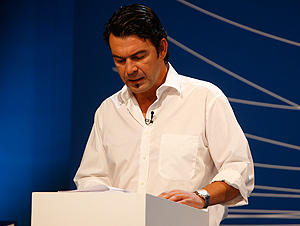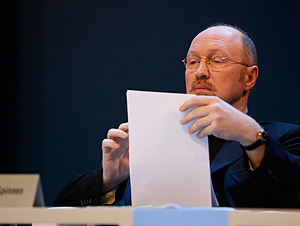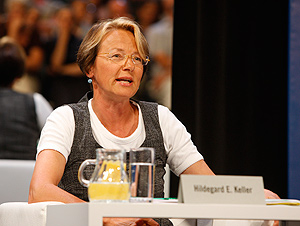 Michel Bozikovic (Bild Johannes Puch)
Michel Bozikovic (Bild Johannes Puch)
Michel Bozikovic (CH) Jury discussion
Michel Bozikovic, who was invited to Klagenfurt by Elisabeth E. Keller, read the text "Wespe". He told of a man, perhaps an "enemy of the state", on the run during a war, who resists arrest by the police.
 Michel Bozikovic (Bild Johannes Puch)
Michel Bozikovic (Bild Johannes Puch)
Video portrait
Reading
Discussion
Winkels: Reminiscent of Hemingway
"To begin with something positive: the short, rhythmic sentences in the present tense and the third person correspond to the situation of the hero," Hubert Winkels commented. However he did have several problems with the text, because it "couldn't come down" from its existential situation of threat to survival. This left the story, which reminded him of a Hemingway story at its climax, no more opportunities for growth. "The story must start there where Quentin Tarantino ends, it needs to be intensified". Otherwise, only "corny clichés" remain.
 Alain Claude Sulzer (Bild: Johannes Puch)
Alain Claude Sulzer (Bild: Johannes Puch)
Sulzer explains idiosyncratic interpretation
"The symphony orchestra is playing fortissimo," said Alain Claude Sulzer, introducing his idiosyncratic interpretation. He is not sure whether the character is really at war, or whether it is just in the imagination of a boy who is travelling on a Swiss motorway and creating the images for himself.
 Burkhard Spinnen (Bild: Johannes Puch)
Burkhard Spinnen (Bild: Johannes Puch)
Strigl: "Swearing soldier style"
"A bold approach", concedes Daniela Strigl, but then disagrees. She is reminded of the Croatian war, even if some references (Pejote) also point towards South America. As in Nestroy's "Einen Jux will er sich machen" the main character is a rough fellow - the author creates the same impression here, mainly by the his main character's frequent swearing.
His vocabulary is the style of an old Landsknecht soldier or that of American war films dubbed into German. A language that for her "destroyed" any "friendly approach" to the text. In addition, there are dramatic faults: one doesn't know why the police wanted to arrest the man; even in wartime, the intention to commit suicide is not a crime. There is a lot going on, but the "tremendous pace" of the text is hard to justify.
Alain Claude Sulzer joined the discussion again here: the language used is not that of the author, but a stylistic device to depict violence. "Yes, but the text does not succeed to make clear where it comes from," added Hubert Winkels.
Jandl: One is dealing with a coward
Paul Jandl tried to interpret next: This is about a deserter in the context of a war, therefore actually a coward. The alleged exceptional psychological situation in which the "hero" is found, is by no means clear with this character "The tyres squeal - where outside of the moves can that really be heard?"
 Hildegard E. Keller (Bild: Johannes Puch)
Hildegard E. Keller (Bild: Johannes Puch)
Jury remained unconvinced by Keller
Praise for the text naturally came from Hildegard E. Keller, but she was in the end not able to convince her colleagues of the "extremely precise" style of the text. The character used language appropriate to him, the structures were "a stylistic device". Behind this "crazy", "depersonalised" character lies "major chaos" where the similarity to Hemingway is the closest and to Nestroy the furthest away.
The speed of the language serves the existential situation of the character who is on the run. The main character had fallen "into trance and delusion, an ecstasy" - the wasp takes him back to reality and stops him from committing suicide.
Feßmann: "The macho with the wasp"
Meike Feßmann: "He is not a deserter, he volunteers". What cannot be understood is that the character ("The macho with the wasp") wanted to kill anyway: the Yugoslav war is a pretext for an adventure story that is told in "sentimental terms" and is reminiscent of boys' yarns from the 50s.
"I doubt that Austrian boys books contain sentences like 'Franz von Fucking Assisi'", argued Strigl.
Spinnen: "Taste must be recognizable"
Finally, Burkhard Spinnen expressed his misgivings that the author might have chosen the wrong section of his text for Klagenfurt, because there was far too little about the intentions of the character. He added: "Literature is like a soup, no matter where you put the spoon, the main flavour must always be recognizable". Here he had let "free-ranging masculinity" overwhelm him.
Barbara Johanna Frank
 TDDL 2011
TDDL 2011